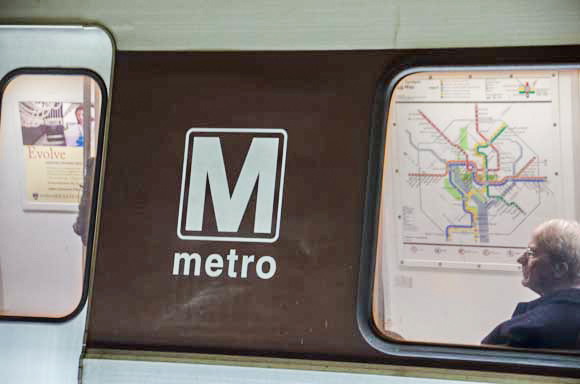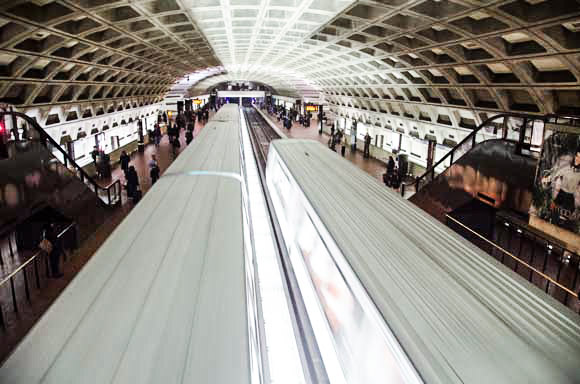Need to know about train delays or track work on the Metro? You could check WMATA.com -- or you could look up
Unsuck DC Metro. The widely followed blog gives D.C. locals more of an honest look behind the scenes at WMATA than its officials are willing or able to give, sometimes beating the transit agency on reporting delays or train malfunctions -- not to mention giving a voice to thousands of disgruntled commuters. He may be a bit of a gadfly, but his blog and Twitter feed really do improve the quality of life for transit users across the system.
In other words, Metrorail gets us where we need to go most days, but with unexplained delays, broken escalators, and lingering safety issues, it isn't exactly a model of efficiency or accountability. We asked the anonymous blogger behind Unsuck DC Metro what he hopes to accomplish by writing, what Metro's major challenges and problems are, and about the future of Metro.
 Q: Can you explain some of the background of your blog, its relationship to Metro, and why you've chosen to remain anonymous? Where did the name "Unsuck DC Metro" come from?
Q: Can you explain some of the background of your blog, its relationship to Metro, and why you've chosen to remain anonymous? Where did the name "Unsuck DC Metro" come from?
A: I started the blog when I became a regular rider. Once during a train offload, I looked around and saw all the people shaking their heads. They had no voice. I made up the name, and started blogging. Near the beginning, I received some weird, vaguely threatening emails, so it seemed best to stay anonymous, but more importantly, the voice of the blog is about a community, not me.
Q: What impact do you hope to make in writing your blog?
A: To bring some accountability to WMATA. I don't think they're accountable to their board or the jurisdictions that fund them. I figured that the best people to bring accountability to it are the thousands of eyes and ears that are on it every day. If Metro was accountable, a lot of these other things would probably get fixed.
Q: Your Twitter feed is often more informative for riders than the Metro's own. How do you keep it up so well?
A: Twitter is the fun and easy part. I enjoy doing it. Doesn't take much time at all.
Q: What is the most significant progress Metro has made since, say the red line crash of June 2009?
A: Before 2009 Metro was what some of my readers and sources in Metro would call a "safety Wild West." In terms of the escalators, tracks, and stations, Metro was almost in a safety free-fall. They've come out of that nosedive a little bit and made it a safer place for employees and riders, but there's still a very long, long way to go.
Q: What are the most major current concerns that Metro should address?
A: Whistleblowers at WMATA stand a very good chance of being retaliated against. I know that's something Metro has said they're trying to change, and perhaps with good intentions, but changing the culture of a big institution takes a long time. Right now, the level of paranoia from some of the people I talk to is very high. There's a bunker mentality — just hide everything. The board really doesn't know what's going on, they don't ask tough questions, they don't demand real answers from Metro staff.
Q: What kind of pressure could be successfully applied to help WMATA achieve positive change in accountability and transparency?
A: Maybe start with being accountable to the board that ostensibly runs them, and to the jurisdictions that fund them. Metro is in this weird "sovereign immunity" zone that functionally allows them to do whatever they want. I don't think it's necessarily with a malicious intent. Anybody who isn't being watched might start to slack a little bit, and they haven't really had anyone checking in on them for decades.
 Q: What do you see as Metro's strengths? What do they have going for them that could inspire confidence in their future or bring about more positive changes?
Q: What do you see as Metro's strengths? What do they have going for them that could inspire confidence in their future or bring about more positive changes?
A: Metro has some really good people still working there. Those people have really good, cost-effective ideas for how to improve things. I'm always amazed at how smart and capable Metro employees can be. I wish they would listen to them. Those people want to be listened to. A lot of them contact me.
Q: If you can picture a WMATA that no longer needs your blog, what would it look like?
A: That's something I've thought about a lot. One post a while back written by someone who used to work at Metro gave an argument that one of Metro's biggest mistakes was staying open so late on weekends. I used to compare Metro to New York or Europe and think "Why can't Metro be 24 hours and be as good as some of the other subways that I've been on?" It really boils down to the fact that it's just a two track system. New York has three tracks. You can take one down to replace it and still keep the subway running normally. This guy's argument talked about that and the political pressure of the board. Metro's board are politicians, so they tend to over-promise what Metro can do. Metro wants to be too many things that they're just not capable of doing, so they're just going to sort of suck at everything. They should be more accountable and transparent, then focus on what they really are capable of doing and become really good at that.